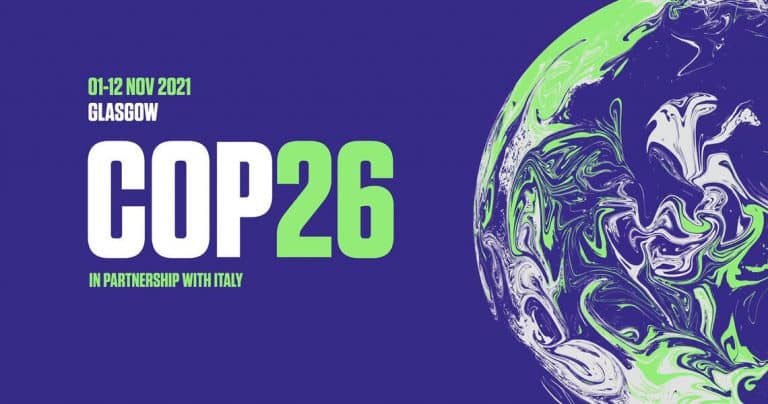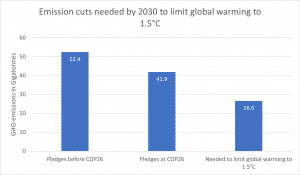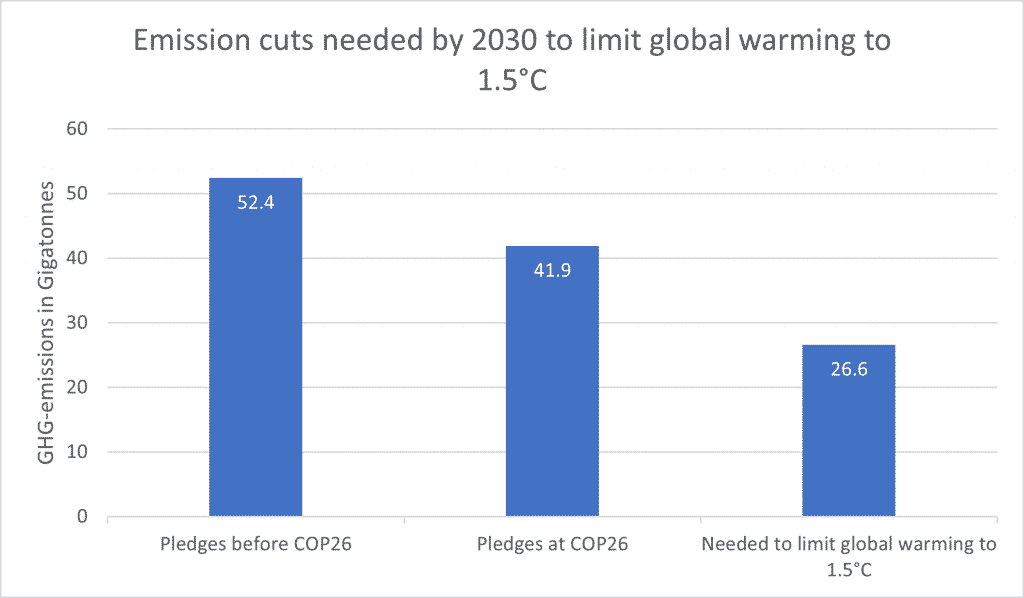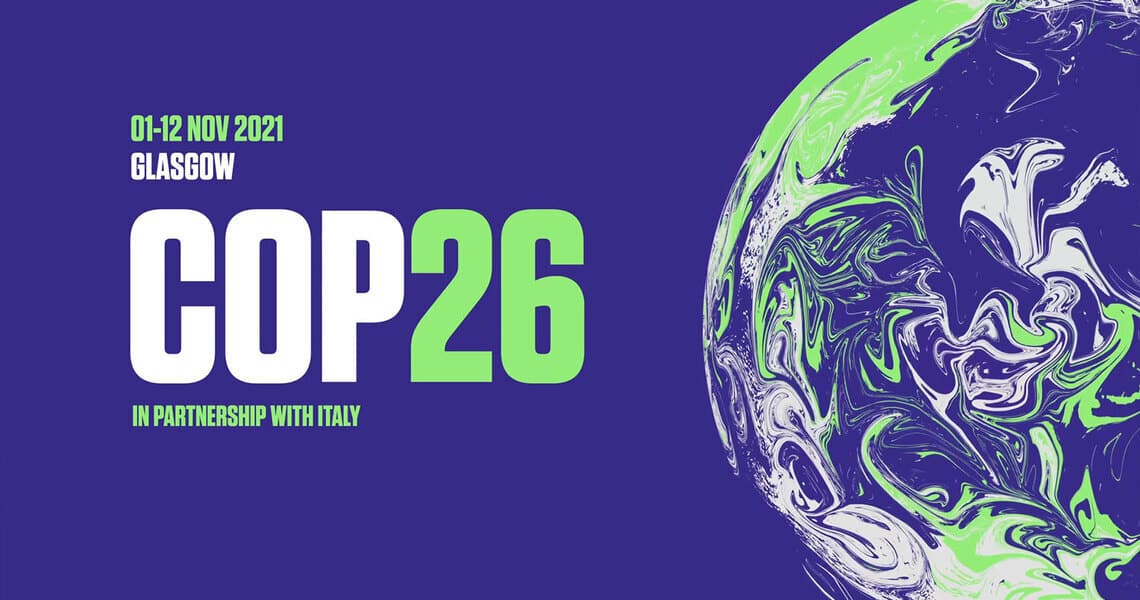
The results of COP26 in Glasgow
COP26 has officially ended on November 13 with the agreement of the participants to the Glasgow Climate pact. COP26 is the United Nations Climate Change Conference of 2021 and took place in Glasgow in the UK this year. It has been the third meeting of the signatories of the Paris Agreement since it has been signed in 2016. The Paris Agreement is demanding from the signatories to announce new national pledges every five years.
We have previously already written an article about the Glasgow UN Climate Change Conference. However, as the conference has now come to an end, this article wants to summarize the final outcomes of the COP26.
NATIONAL GOALS
One of the biggest concerns of COP26 was to set new national goals, which would align the signatories of the Paris Agreement keep the temperature limit of lgobal warming to 1.5°C. But while a lot of new pledges were released shortly before Glasgow, the new commitments still fall short of reaching this goal. Instead, the participants decided to renegotiate national plans at a new conference in Egypt next year, deferring climate action further to the future. At the conference an annual process is going to be set into place, which will assess the national targets on greenhouse gas emission yearly.
However, we still need to consider, that these climate summits usually are said to deliver no outcomes for climate change mitigation and adaptation at all. But since the Climate Conference in 2015, when scientists still predicted a global warming of 4°C, the predictions were forecasting a global warming of around 2.7°C just before the COP26. If all of the promises, that were made at the conference now, will be held the climate would be warming about 2.4°C. This is of course still very far from the proclaimed 1.5°C, but nevertheless a remarkable step forward. If this momentum holds on the climate crisis might still get tamed in the future.

COAL PHASE DOWN
Another important outcome of COP26 is the decision of the participants to “phase-down” coal. It was one of the hottest topic at COP26. In the Glasgow Climate Pact the original wording was to “phase out” of coal. But as China and India lobbied for a weakened wording, the final compromise was to “phase-down” the worst fossil fuel for greenhouse gases.
Not only the watering down of the wording was criticized by activists but also the fact that the other two fossil fuel sources, oil and gas, were not tackled in the conference, giving especially rich countries the opportunity to keep polluting the planet by producing more oil and gas.
CHINESE-AMERICAN CLIMATE TASK-FORCE
Another point that is to be mentioned when talking about results of COP26 is the alliance that was formed between the USA and People’s Republic of China, as it does not only represent the mending diplomatic relationship between the two biggest economies in the world, but also a significant step towards increased climate action in the future. However, there were no concrete plans as to what the tasks of this newly established organization should be and which goals it will pursue.
CLIMATE FINANCE & DEVELOPPING COUNTRIES
Especially developing countries in climate hot spots, which are particularly vulnerable to extreme weather events and natural catastrophes are disappointed by the new deal. There has not been enough climate finance provided to cope with current climate change impacts and adapt to ongoing-problems in the long-run. The support provided is not only falling short of promises, but even If those were fulfilled, they would be insufficient to cover the cost incurred. In 2009 developed nations promised to provide $100bn per year to emerging economies by 2020.
Mohamed Adow, director of the Nairobi-based thinktank Power Shift Africa, took a harsher view: “The needs of the world’s vulnerable people have been sacrificed on the altar of the rich world’s selfishness. The outcome here reflects a Cop held in the rich world and the outcome contains the priorities of the rich world.” Shauna Aminath, environment minister for the Maldives, said: “We have 98 months to halve global emissions. The difference between 1.5 and 2 degrees is a death sentence for us.”
To conclude, COP26 is especially by environmental activists and NGOs seen as another long summit with loads of discussions and negotiations, which did not yield results that set the world up for 1.5°C. Politicians and participants of the COP26 however see it as an important step towards more climate action in the future. It is clear for sure, that no climate summit ever yielded that much press coverage. As the world was watching what world leaders decided about the future of our planet and humanity, there is still a lot of work to be done.
https://www.bbc.com/news/world-59277788
https://ukcop26.org/wp-content/uploads/2021/07/COP26-Explained.pdf
Author: Nelly Eggert
The results of COP26 in Glasgow
COP26 has officially ended on November 13 with the agreement of the participants to the Glasgow Climate pact. COP26 is the United Nations Climate Change Conference of 2021 and took place in Glasgow in the UK this year. It has been the third meeting of the signatories of the Paris Agreement since it has been signed in 2016. The Paris Agreement is demanding from the signatories to announce new national pledges every five years.
We have previously already written an article about the Glasgow UN Climate Change Conference. However, as the conference has now come to an end, this article wants to summarize the final outcomes of the COP26.
NATIONAL GOALS
One of the biggest concerns of COP26 was to set new national goals, which would align the signatories of the Paris Agreement keep the temperature limit of lgobal warming to 1.5°C. But while a lot of new pledges were released shortly before Glasgow, the new commitments still fall short of reaching this goal. Instead, the participants decided to renegotiate national plans at a new conference in Egypt next year, deferring climate action further to the future. At the conference an annual process is going to be set into place, which will assess the national targets on greenhouse gas emission yearly.
However, we still need to consider, that these climate summits usually are said to deliver no outcomes for climate change mitigation and adaptation at all. But since the Climate Conference in 2015, when scientists still predicted a global warming of 4°C, the predictions were forecasting a global warming of around 2.7°C just before the COP26. If all of the promises, that were made at the conference now, will be held the climate would be warming about 2.4°C. This is of course still very far from the proclaimed 1.5°C, but nevertheless a remarkable step forward. If this momentum holds on the climate crisis might still get tamed in the future.

COAL PHASE DOWN
Another important outcome of COP26 is the decision of the participants to “phase-down” coal. It was one of the hottest topic at COP26. In the Glasgow Climate Pact the original wording was to “phase out” of coal. But as China and India lobbied for a weakened wording, the final compromise was to “phase-down” the worst fossil fuel for greenhouse gases.
Not only the watering down of the wording was criticized by activists but also the fact that the other two fossil fuel sources, oil and gas, were not tackled in the conference, giving especially rich countries the opportunity to keep polluting the planet by producing more oil and gas.
CHINESE-AMERICAN CLIMATE TASK-FORCE
Another point that is to be mentioned when talking about results of COP26 is the alliance that was formed between the USA and People’s Republic of China, as it does not only represent the mending diplomatic relationship between the two biggest economies in the world, but also a significant step towards increased climate action in the future. However, there were no concrete plans as to what the tasks of this newly established organization should be and which goals it will pursue.
CLIMATE FINANCE & DEVELOPPING COUNTRIES
Especially developing countries in climate hot spots, which are particularly vulnerable to extreme weather events and natural catastrophes are disappointed by the new deal. There has not been enough climate finance provided to cope with current climate change impacts and adapt to ongoing-problems in the long-run. The support provided is not only falling short of promises, but even If those were fulfilled, they would be insufficient to cover the cost incurred. In 2009 developed nations promised to provide $100bn per year to emerging economies by 2020.
Mohamed Adow, director of the Nairobi-based thinktank Power Shift Africa, took a harsher view: “The needs of the world’s vulnerable people have been sacrificed on the altar of the rich world’s selfishness. The outcome here reflects a Cop held in the rich world and the outcome contains the priorities of the rich world.” Shauna Aminath, environment minister for the Maldives, said: “We have 98 months to halve global emissions. The difference between 1.5 and 2 degrees is a death sentence for us.”
To conclude, COP26 is especially by environmental activists and NGOs seen as another long summit with loads of discussions and negotiations, which did not yield results that set the world up for 1.5°C. Politicians and participants of the COP26 however see it as an important step towards more climate action in the future. It is clear for sure, that no climate summit ever yielded that much press coverage. As the world was watching what world leaders decided about the future of our planet and humanity, there is still a lot of work to be done.
https://www.bbc.com/news/world-59277788
https://ukcop26.org/wp-content/uploads/2021/07/COP26-Explained.pdf
Author: Nelly Eggert
RELATED
The Earthshot Prize 2022
The Earthshot Prize 2022 The Earthshot prize is an award given to five winners that created some projects that could help our planet face some of the most important challenges...
Read MoreThe Key Role of Natural Gas As a Transition Fuel
The Key Role of Natural Gas As a Transition Fuel In recent years sustainable energy has surely been the center of attention, with worldwide spending on renewable energy surpassing even...
Read More


